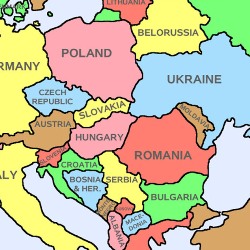Sports Betting Legislation Across Eastern Europe

As attitudes towards gambling continues to shift, more countries are beginning to reexamine their current laws regarding the various forms of betting and gaming. Sports betting in particular is being seen in a new light, with many Western European countries now actively considering whether or not to legalize the activity. Progress is advancing more slowly on the other side of the continent, though, and here is a look at the current status of sports betting legislation in some of those Eastern European countries:
Estonia
Tiny Estonia has already opened its sports betting market up to foreign operators, greatly increasing the size of the country’s market. Its current online sports betting law passed in 2012 eliminated the mandate that operators should have a server located within the country’s borders in order to receive a license. At the present time, Estonia is focusing on fighting illegal sports betting, and going after operators who continue to provide services without the necessary licensing from the Estonian Tax and Customs Board.
Latvia
Latvia’s sports betting law was passed in 1998, and has provisions that allow for the banning of foreign operators who do not follow the guidelines set forth by the government. In 2014, Latvia then began banning some illegal operators who did not obtain licensing status from their Lotteries and Gambling Supervisory Inspection, or violated the law.
Lithuania
Currently, 17 countries have permission to offer online gambling, but sports betting is banned; however, since Lithuanians generally do not seem to have an interest in online sportsbooks, the country has not done much to try and curb illegal online sports betting.
Russia
Online sports betting is illegal in Russia, but there are still illegal foreign operators accepting bets from Russian residents. Moscow has threatened to block these sites, but has not taken an major steps to do so as of yet.
Albania
The Albanian government is currently developing a licensing program to allow for legal online sports betting in the country.
Bulgaria
In Bulgaria, there is a formal licensing system for online sports betting. Financial requirements are also very relaxed, making it possible for foreign operators to perform well in the country.
Bosnia and Herzegovina
Online sports betting is illegal in this country once part of Yugoslavia. Still, illegal sites are rampant, and attempts to block them have not worked.
Croatia
Croatian laws only allow for brick-and-mortar sports betting shops and these laws seem to have worked, leading to less illegal online sports betting than takes place in neighboring Balkan countries.
Macedonia
Online sports betting is very popular in Macedonia, and currently the country has what some consider a state-run monopoly of the industry. This has caught the eye of the European Commission, which is monitoring the situation to see if Macedonia is violating European laws that prohibit monopolies.
Montenegro
In 2006, Montenegro passed legislation to legalize online sports betting and other types of iGaming. Licenses are issued by the Games of Chance Administration.
Romania
After a law that would have banned foreign online sportsbook operators in Romania was blocked by the European Commission, the Balkan nation began licensing online sports betting sites from foreign operators. Romanian bettors now have numerous online options to choose from as a result.
Serbia
Serbia has been actively fighting illegal online gambling since 2011 when an initiative was launched to put an end to black market betting. Some illegal sites have closed as a result of the crackdown.
Slovenia
Brick-and-mortar sports betting is legal in Slovenia with licenses being issued under guidelines set forth by the Slovenian Gaming Act. The law does not make mention of online sports betting, though, so the industry is currently unregulated in the country.
Czech Republic
Online sports betting is legal in the Czech Republic, but licenses are only given to Czech operators who pay a tax. International sports betting sites are illegal but are not blocked.
Slovakia
The Slovakian government has not banned online sports betting but has also not taken steps to issue any licenses to operators. As a result, international sites freely accept bets from Slovakians without any type of licensure.
Poland
In the wake of a major scandal that involved Polish political figures, Poland began strictly regulating its sports betting market. Operators who have some type of presence within the country’s borders can apply for a license that lasts for 6 years. The European Commission is closely monitoring the situation in Poland in an attempt to keep the country’s market free from monopolies.
Ukraine
Sports betting is illegal in the Ukraine, and the government has pressed charges against players found using banned online sites. Lottery organizations do offer some types of gambling in the country, but there has been no talk of legalizing sports betting.










